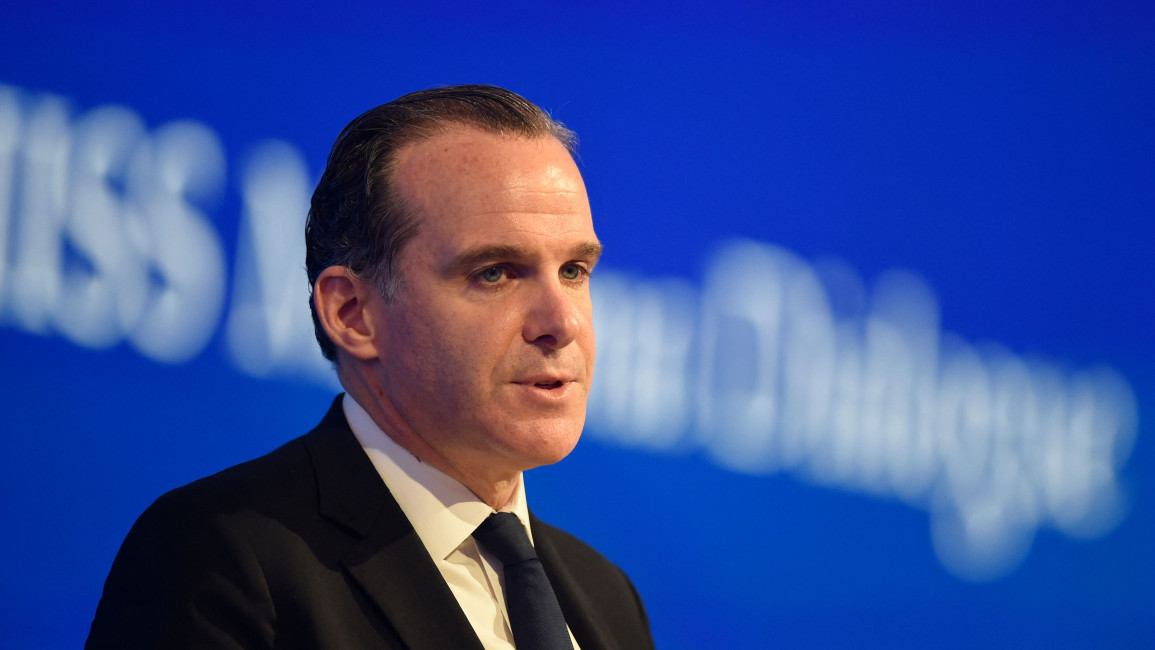White House's Middle East coordinator Brett McGurk heads to Iraq
The White House Coordinator for the Middle East and North Africa, Brett McGurk, will visit Iraq and the Iraqi Kurdistan Region (IKR) on Monday to meet with senior Iraqi and Kurdish officials, Kurdish officials told Kurdish media outlets.
"Following his meetings in Baghdad, the US official is set to meet with the Kurdish leadership, including President of the Democratic Party of Kurdistan (KDP) Masoud Barzani, Kurdistan Region President Nechirvan Barzani as well as the leaders of the Patriotic Union of Kurdistan (PUK)," Fawzi Hariri, chief of staff to the president of Kurdistan region today told Kurdistan 24, and Rudaw two outlets close to the ruling Kurdistan Democratic Party (KDP).
Safeen Dizayee, the head of the Kurdistan Regional Government (KRG) foreign relations office, also confirmed the news to Rudaw. Neither the media office of Iraqi Prime Minister Mohammed Shia al-Sudani nor Iraq's state media announced anything regarding the expected visit.
After Iraq, McGurk is expected to visit Turkey.
PUK slams KDP: “Kurdistan's history has never seen a worse cabinet.” Intra-KRG relations have deteriorated badly. White House Middle East supremo Brett McGurk will reportedly arrive in Erbil shortly, and one imagines this crisis will be high on the agenda. https://t.co/fH8YsD3Vtu https://t.co/x1P19jMyYD
— Aron Lund (@aronlund) January 16, 2023
The visit coincides with recent developments in Iraq and the northern Kurdish region.
While McGurk is expected to discuss the presence of US and other foreign troops in Iraq with Iraqi Prime Minister Sudani, the White House Coordinator is also expected to try to defuse recent tensions between the two main ruling parties in the Kurdistan region, the Kurdistan Democratic Party (KDP) of the Barzani family and the Patriotic Union of Kurdistan (PUK) lead by the Talabani family.
Hariri, however, told Rudaw that the visit by McGurk has nothing to do with the internal issues between the Kurdish ruling parties. He said that the visit was a political one by McGutor to understand the situation in Iraq and the Kurdistan region".
The New Arab contacted Dizayee and an Iraqi lawmaker from the security and defence committee in the Iraqi parliament, but they were not immediately available to comment.
TNA also spoke with Sakfan Yusuf, another Iraqi MP from the same committee, but he said he is not aware of the matter. TNA spoke with an official from the general secretary of the Iraqi Government’s Council of Ministers, however, the official said they are not authorised to speak to the press on the issue.
As US envoy to the anti-Islamic State (IS) Global Coalition from 2015, McGurk was instrumental in US support for the Kurdish-led militias in Syria as they fought IS, which tore through Syria and neighbouring Iraq the year before.
The current Iraqi PM defended the open-ended presence of US and other foreign troops in his country, in an interview published Sunday.
"We think that we need the foreign forces," Sudani told The Wall Street Journal in his first US interview since taking office in October.
US and NATO forces have been training Iraqi soldiers on how to fight the Islamic State group. "Elimination of ISIS needs some more time," Sudani added.
His comments are significant because the parties that back him and control parliament are aligned with pro-Iranian factions and are regarded to be very hostile to the United States. Iraq also depends on Iran for natural gas and electricity.
The KDP and the PUK mainly run the KRG but now they are at odds with how to administrate crucial sectors in the region, particularly the oil and gas sector, how to share ravenous from the border gates, and settling differences on holding fresh parliamentary elections.
On Sunday, Masrour Barzani, the KRG PM accused the PUK of trying to obstruct upcoming parliamentary elections, stealing income from the border gates, and being behind the assassination of Hawkar Abdullah Rasoul, known as Hawkar Jaff, a former colonel in the ranks of PUK's Counter-Terrorism Group (CTG), who was killed in the capital city of Erbil on 7 October after a sticky bomb, attached to his vehicle, detonated.
Jaff was supervising the CTG operations in Nineveh and was fired in the summer of 2021 due to an internal issue between cousins Bafel Talabani and Lahur Talabani - then co-leaders of PUK, as Jaff was a close ally to Lahur.
Kurdistan Region Security Council (KRSC), an institution controlled by the KDP, on 12 October aired alleged confessions of six suspects in the killing. The KRSC claimed that the "terrorist explosion" was "conducted by a team of CTG-Sulaymaniyah and by direct orders from the head of CTG Wahab Majid Baqi, known as Wahab Halabjayi, and CTG head of intelligence Karzan Muhammad Rasheed."
Accordingly, an Erbil court has issued arrest warrants against Halabjayi, Rasheed, Bafel and Qubad. The CTG denied any involvement in the killing of Jaff.
On Monday, Qubad Talabani and PUK ministers boycotted a weekly session of the KRG council of ministers in Erbil. Furthermore, the party refuted all allegations against it and accused the KDP of depriving Sulaimaniyah and other provinces under the power of PUK, of KRG revenues in Erbil.
The KDP, which controls the Kurdish government in Erbil, and the PUK, which dominates areas along the Iranian border and is headquartered in Sulaimaniya, are the two main parties ruling the Iraqi Kurdish region.
Both parties have their separate peshmerga forces, security and intelligence agencies. They fought an internal conflict from 1994 until 1998 when they signed a peace deal in Washington under the sponsorship of the US government.
People of the Kurdistan region are worried that both parties will engage in another round of civil conflict.



